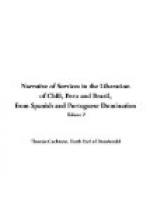In the dead of the night preceding the day fixed for his execution, Lady Cochrane was awoke by loud lamentations beneath her window. On sending to ascertain the cause, the wretched wife of the criminal was found imploring her Ladyship’s intercession that her husband should not be deprived of the benefits of confession and absolution. Forgiving the atrocity of the act, Lady Cochrane, on the following morning used all her influence with the authorities, not for this alone, but to save the man’s life, and at length wrung from them a reluctant consent to commute his punishment to banishment for life.
CHAPTER II.
SECOND EXPEDITION TO PERU—DISAPPOINTMENT AT NOT BEING PROVIDED WITH TROOPS—FAILURE OF ROCKETS—DEPARTURE FOR ARICA—CAPTURE OF PISCO—CAPTURE OF SPANISH SHIPS AT PUNA—DETERMINE TO MAKE AN ATTEMPT ON VALDIVIA—ARRIVAL OFF THAT PORT, AND CAPTURE OF SPANISH BRIG OF WAR POTRILLO—TROOPS OBTAINED FROM CONCEPTION—FLAG-SHIP NEARLY WRECKED—ATTACK ON FORTS, AND CONQUEST OF VALDIVIA.
On the 12th of September, 1819, I again sailed for the Peruvian coast, with Admiral Blanco as second in command. The squadron consisted of the O’Higgins, San Martin, Lautaro, Independencia, and Puyrredon, the Galvarino and Araucano not being in readiness. Two vessels accompanied the squadron, to be afterwards fitted up as fire-ships.
The Government was exceedingly anxious that some decisive blow should be at once struck. With the exception of the rockets, the squadron was in little better condition than before, a loan having failed, whilst 4,000 dollars only were subscribed by the merchants. The crews for the most part consisted of cholos, or native peasants, whom it was difficult to shape into good seamen, though they fought gallantly when well led. The officers were nearly all English or North American, this being a redeeming feature, but very few of them possessed the tact to bring up the men to anything like a seaman-like standard; a by no means easy task however, as a considerable portion of those embarked did duty both as marines and seamen.
I begged of the Government to supply me with 1,000 troops, asserting that even with that number of men it would be possible to take the castles of Callao, and destroy the whole of the Spanish shipping in the harbour. I was assured that this force had been provided, and was in readiness to embark at Coquimbo, where, on my arrival on the 16th, in place of 1,000 troops I found only 90!—and these in so ragged a condition, that a subscription of 400 dollars was raised by the inhabitants, and given to Major Miller to buy clothing for them.
I was so much annoyed at this, as to be on the point of returning to Valparaiso to throw up my commission; but, reflecting that the squadron was in possession of rockets, and that the Government might even yet forward a military force, I made up my mind to proceed, and on the 29th the squadron again came to an anchor in Callao roads.




